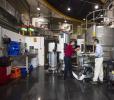
Diamond for biological sensing applications
Nitrogen-doped ultrananocrystalline diamond (N-UNCD) is a promising material for future biological and electrochemical applications.

Showing 841 - 860 of 2722 results

Nitrogen-doped ultrananocrystalline diamond (N-UNCD) is a promising material for future biological and electrochemical applications.
Low-cost X-ray detectors featuring high sensitivity, durability and physical flexibility are required in fields ranging from medical imaging to defence. In this study, a new material for X-ray detection was coupled with inkjet printing to produce a series of prototype X-ray detectors.

Soft X-ray experiments used to characterise new thin film topological Dirac Semimetal.

X-ray absorption spectroscopy (XAS) is a versatile tool for chemistry, biology, and materials science. By probing how x rays are absorbed from core electrons of atoms in a sample, the technique can reveal the local structure around selected atoms.

Since the discovery of superconducting Caintercalated graphite (CaC6) the intercalation of epitaxial graphene on SiC(0001) with Ca has been studied extensively in order to achieve superconductivity.

The THz/Far-IR Beamline couples the high brightness and collimation of a bend-magnet synchrotron radiation to a Bruker IFS125HR spectrometer providing high-resolution spectra (0.00096 cm-1) with signal to noise ratio superior to that of thermal sources up to 1350 cm-1 for gas-phase applications; the beamline also delivers signal to noise ratio superior to that of thermal sources up to 350 cm-1 for condensed phase samples.

The Multi-wavelength absorption black carbon instrument MABI can determine the concentration and source of black carbon pollution.
Atomic structure of new cathode material for sodium ion batteries helps explain long life
Fish farming is increasing globally to provide an affordable source of protein and income security for local communities. Joshua's research project aims to optimise production of tilapia to enhance food and nutritional security in PNG.

The high-energy heavy-ion microprobe is used for the characterisation or modification of material properties at depths from approximately 1 micrometre to maximum depths of up to 500 micrometres from the material surface.
The new Micro Computed Tomography (MCT) beamline is the first instrument to become operational as part of the $94 million Project BRIGHT program, which will see the completion of eight new beamlines at ANSTO’s Australian Synchrotron.

ANSTO offers a diverse range of career opportunities within science, engineering, corporate services and trade disciplines.
Combining scientific expertise with more than $1.3 billion in unique operational assets to provide optimal radioactive waste solutions.

We understand that electrochemistry, electrode design and failure modes of your battery system are going to determine your design and research decisions.

ANSTO is one of Australia’s largest public research organisations and is widely recognised as an international player in the field of nuclear science and technology.

The User Office is the first point of contact for all new and returning facility users accessing ANSTO’s wide range of world-class research infrastructure. These users may be internal ANSTO researchers, external merit researchers, commercial clients, scientific collaborators and partners.

Health researchers at ANSTO use world-class nuclear and isotopic techniques to undertake research and development activities to address some of the most challenging health problems.
The Australian Synchrotron is a source of powerful X-rays and infrared radiation that can be used for a wide range of scientific and technical purposes. Synchrotron X-rays are millions of times brighter than those produced by conventional X-ray machines in laboratories and hospitals.

The radiography program focuses on the development of Neutron Capture Enhanced Particle Therapy (NCEPT) from initial preclinical work, to clinical trials and finally commercial translation and licencing.